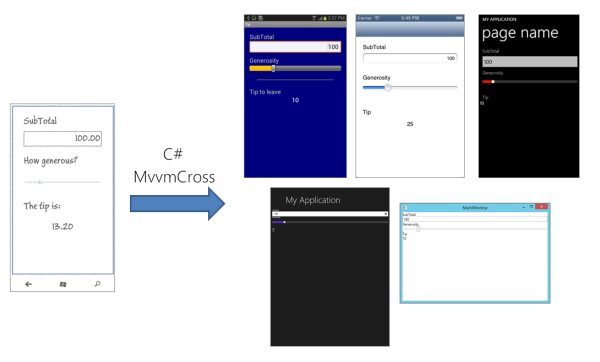Introduction
This article is a recap at the end of the TipCalc tutorial for MvvmCross v3 - Hot Tuna!
The Story Was...
Over the course of these articles, we've covered the complete TipCalc app on 5 platforms from one shared PCL code library using MVVM.

I hope this was simple and easy to follow.
Just to recap what we did:
- For the core PCL library, we:
- created a Profile 104 library
- added some
MvvmCross PCL libraries - added our services - the
Calculator - added our
TipViewModel which exposed properties - added our
App which wired the services together and defined an IMvxAppStart
- For each platform, we generally went through a process like:
- created a platform specific project
- added some
MvvmCross PCL libraries - added some
MvvmCross platform specific libraries - added a
Setup class which would initialise everything - modified the platform-specific application to call
Setup - created a
Views folder - added a platform specific
View - changed that
View base class to something beginning with Mvx - added a
public new TipViewModel ViewModel to link the View to the ViewModel - modified the XML for that
View to add the UI fields - modified those UI fields to add databinding to the
ViewModel properties - pressed 'Run'

- considered some ways that the UI could be improved using platform-specific UI techniques
Generally, these same steps are what you'll follow for each MvvmCross application you want to make.
We'll cover more advanced topics in future articles.
Thanks for reading.
Stuart

The Articles
History
- 22nd March, 2013 - First submission
